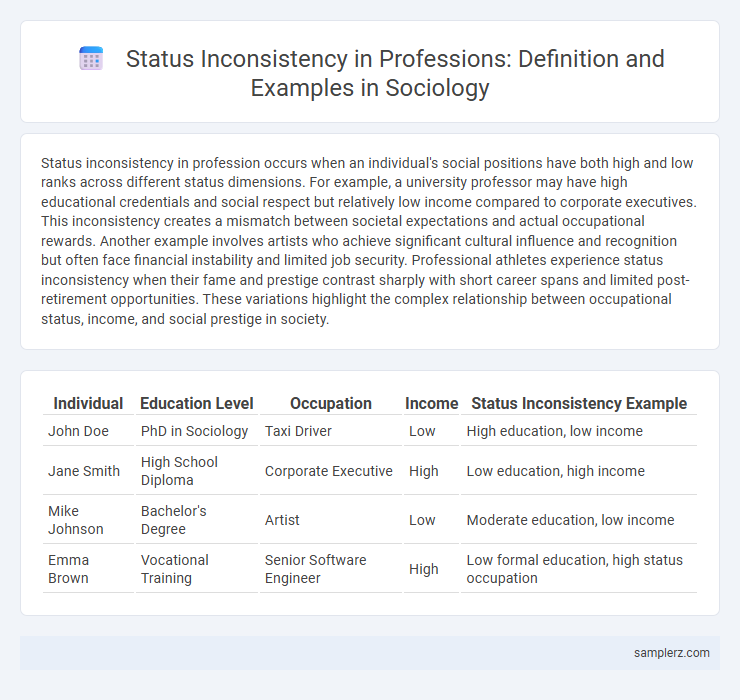Status inconsistency in profession occurs when an individual's social positions have both high and low ranks across different status dimensions. For example, a university professor may have high educational credentials and social respect but relatively low income compared to corporate executives. This inconsistency creates a mismatch between societal expectations and actual occupational rewards. Another example involves artists who achieve significant cultural influence and recognition but often face financial instability and limited job security. Professional athletes experience status inconsistency when their fame and prestige contrast sharply with short career spans and limited post-retirement opportunities. These variations highlight the complex relationship between occupational status, income, and social prestige in society.
Table of Comparison
| Individual | Education Level | Occupation | Income | Status Inconsistency Example |
|---|---|---|---|---|
| John Doe | PhD in Sociology | Taxi Driver | Low | High education, low income |
| Jane Smith | High School Diploma | Corporate Executive | High | Low education, high income |
| Mike Johnson | Bachelor's Degree | Artist | Low | Moderate education, low income |
| Emma Brown | Vocational Training | Senior Software Engineer | High | Low formal education, high status occupation |
Status Inconsistency: When Credentials and Income Don’t Align
A university professor with a PhD earning a modest salary exemplifies status inconsistency, where high educational credentials do not translate into equivalent income. Similarly, skilled tradespeople like electricians or plumbers often generate higher earnings despite possessing less formal education. This disconnect between credentials and income highlights complexities in professional status and social recognition.
High Education, Low Pay: The Paradox of Social Workers
Social workers often experience status inconsistency due to their high educational qualifications contrasted with relatively low salaries. Despite holding advanced degrees in social work or related fields, their compensation does not reflect the level of expertise or responsibility required. This paradox highlights systemic undervaluation within the profession, contributing to challenges in recruitment and retention.
Prestigious Title, Modest Earnings: The Case of Academics
Academics often experience status inconsistency by holding prestigious titles such as professor or researcher while earning modest salaries compared to other professions with similar education levels. This disparity arises from the high social esteem and intellectual recognition associated with academic positions, which contrasts sharply with their relatively low monetary compensation. Such inconsistency highlights the complex relationship between occupational prestige and economic reward within the social stratification system.
Celebrated Skill, Limited Respect: Chefs in Fine Dining
Chefs in fine dining exhibit status inconsistency by possessing celebrated culinary skills yet receiving limited social respect outside their profession. Despite their expertise and creative influence, they often struggle to achieve the high-status recognition accorded to professions like doctors or lawyers. This disparity highlights the complex relationship between skill level and social esteem in occupational hierarchies.
High Visibility, Low Influence: Journalism’s Status Dilemma
Journalists often experience status inconsistency by holding high visibility yet possessing low influence within professional hierarchies, as their public recognition contrasts sharply with limited decision-making power in media organizations. This discrepancy arises because journalism's societal impact and audience reach do not necessarily translate into authority over editorial policies or organizational directions. Such status dilemmas highlight the complex dynamics between occupational prestige and actual professional influence in the media industry.
Overqualified Yet Underemployed: International Doctors
International doctors often face status inconsistency when overqualified yet underemployed, working in positions that do not reflect their medical expertise or training. Despite holding advanced medical degrees and certifications, many are employed in non-medical or lower-skilled jobs due to licensing barriers and lack of local recognition. This mismatch affects their professional identity and social status, highlighting systemic obstacles within healthcare labor markets.
Well-Respected but Underpaid: Teachers and Professors
Teachers and professors often experience status inconsistency by holding high social respect while receiving relatively low salaries compared to other professions with similar educational requirements. Despite their critical role in shaping future generations and contributing to societal development, their compensation frequently fails to reflect their level of expertise and social value. This disparity highlights the complex relationship between occupational prestige and economic reward within professional hierarchies.
Wealth Without Esteem: The Reality for Used Car Salespeople
Used car salespeople often experience status inconsistency as their profession generates substantial wealth but lacks social esteem. Despite earning competitive commissions and bonuses, they face negative stereotypes and distrust from the public. This disparity highlights the complex relationship between economic success and social respect within occupational hierarchies.
High Authority, Low Wages: Police Officers in Small Towns
Police officers in small towns often experience status inconsistency by holding positions of high authority within the community while earning comparatively low wages. Despite their critical role in maintaining public safety and law enforcement, their salaries frequently lag behind those of counterparts in larger cities or private sectors. This discrepancy highlights the social tension between occupational prestige and economic compensation in rural law enforcement.
Blue-Collar Prestige: Skilled Trades vs. Perceived Status
Skilled trades such as electricians, plumbers, and welders exemplify status inconsistency in professions where blue-collar expertise commands high practical value but lower societal prestige compared to white-collar jobs. Despite requiring advanced technical skills and certifications, these trades often face perceptions of lower status due to cultural biases favoring academic credentials. This discrepancy highlights the social divide between occupational respect and actual economic or functional importance.

example of status inconsistency in profession Infographic
 samplerz.com
samplerz.com